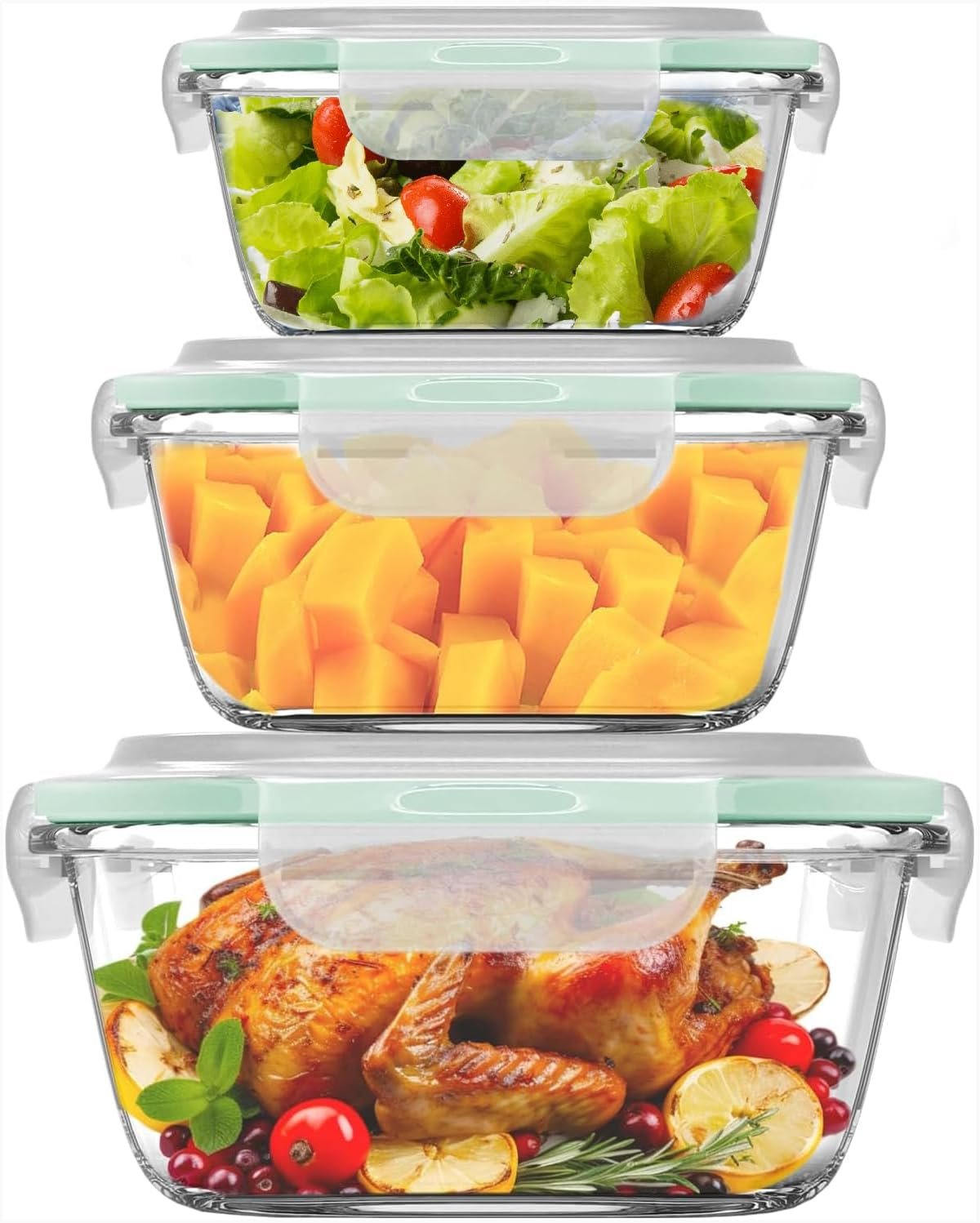Have you ever opened a bag of chips a few days after sealing it with just a clip and found them stale? That’s because air is an enemy of freshness. So, how do airtight containers keep food fresh, and why are they essential? Let’s dive into how these containers can prolong the life of your favorite meals.
The Science Behind Airtight Containers
Airtight containers are specifically designed to create a sealed environment where air cannot easily enter or escape. By minimizing air exposure, these containers help preserve food’s freshness. The less air present, the slower the spoilage process, which is what makes airtight containers a must-have for your kitchen.
Oxygen Control and Its Role in Freshness
Air contains oxygen, and oxygen speeds up the oxidation process, which leads to food going bad. Ever notice how apple slices turn brown after sitting out? That’s oxidation. Airtight containers, like Razab glass food storage containers, limit the amount of oxygen in contact with food, slowing down oxidation and keeping your meals fresher for longer.
Moisture Regulation
Some foods lose their crispiness when they absorb moisture from the air, while others dry out as they lose water content. Airtight containers help keep moisture at an optimal level. If you store crackers in an airtight container, they stay crisp because the container prevents moisture from getting in. Similarly, foods like bread retain their softness by staying protected from excess air.
Bacteria and Mold Growth Prevention
Bacteria and mold thrive in environments with air and moisture. Airtight containers reduce both, limiting the conditions in which bacteria can multiply. This is particularly important for perishable items like dairy or leftovers. The sealed environment keeps out airborne bacteria and mold spores, so you don’t have to toss your food so soon.
Types of Airtight Containers
Not all airtight containers are created equal. Different materials offer unique benefits and drawbacks. Let’s look at the options and how they can impact your food storage game.
Glass Food Storage Containers
Glass containers, such as Razab glass food storage containers, are perfect for preserving food. They don’t absorb odors or stains, making them ideal for storing leftovers or meal-prepped dishes. Plus, they’re durable and can go straight from the fridge to the microwave, saving you time and effort.
Plastic Containers
Plastic is often more affordable than glass, but it comes with its own set of issues. Plastic can absorb the smell of strong foods, and if scratched, it can harbor bacteria. That said, high-quality plastic containers with tight-sealing lids can still do an excellent job of keeping air and moisture out.
Silicone Options
Silicone is another growing trend in food storage. It’s flexible, making it easier to store, and it’s resistant to extreme temperatures, so you can safely freeze or heat your meals. However, silicone containers are typically more expensive than plastic or glass.
How Airtight Containers Help with Meal Prep
If you’re into meal prepping, airtight containers are your new best friend. Proper food storage ensures that all your hard work prepping meals for the week doesn’t go to waste. You don’t want to spend hours cooking only to find out that your food has gone bad after just a few days.
Benefits of Meal Prep Containers
Meal prep containers, like Shazo, are designed to keep each component of your meal separate and fresh. Whether you’re meal prepping for the week or portioning out snacks for a day, airtight containers ensure your food stays just as fresh as the day you prepped it.
Time-Saving Benefits
By prepping meals in airtight containers, you can save hours during the week. No need to cook each meal from scratch every day. Plus, if you use quality containers like Shazo, you can be confident that your prepped meals will taste just as good on day five as they did on day one.
How to Choose the Best Airtight Containers
Choosing the best airtight container for your needs depends on several factors, from durability to size and shape. Here’s how to make an informed choice.
Durability and Material
The material of your container plays a big role in its durability. Glass containers, like those from Razab, are tough and last longer, while plastic ones might degrade faster, especially if they get scratched or stained over time. Silicone containers are flexible and long-lasting, making them a versatile option.
Size and Shape Considerations
Think about what you plan to store. For soups and stews, deeper containers are better, while flat, wide containers work well for meal-prepped lunches or snacks. Containers like those from Shazo offer a variety of sizes to suit different needs.
Maintaining Your Airtight Containers
Your airtight containers are an investment, so it’s worth maintaining them to ensure they last as long as possible. Let’s talk about care tips.
Cleaning and Storage
To keep your containers in tip-top shape, always clean them thoroughly after each use. For glass containers, a simple wash with soap and water will do the trick, while plastic containers may require a deeper clean if they’ve been storing oily foods. Silicone containers, on the other hand, are usually dishwasher-safe, making them easy to maintain.
Longevity Tips
Avoid microwaving plastic containers, as this can weaken them over time. For glass and silicone, they’ll last longer if handled with care and kept away from abrasive sponges or harsh chemicals. Regularly check the seals on your lids to make sure they’re still tight and replace them when necessary.
Final Thoughts
Airtight containers are more than just a convenience – they’re essential for keeping your food fresh and reducing waste. Whether you’re a meal-prep master using Shazo containers or you prefer the durability of Razab glass food storage containers, airtight solutions can save you time, money, and frustration. So, next time you’re packing away those leftovers or prepping meals for the week, remember that a good airtight container is your best defense against food spoilage.
FAQs
1. Can I use airtight containers for freezing food?
Yes, many airtight containers, especially glass and silicone, are freezer-safe. Just make sure to leave some space at the top for expansion if you’re freezing liquids.
2. Do glass food storage containers retain odors?
No, glass containers like Razab don’t absorb odors, making them perfect for strong-smelling foods.
3. Are meal prep containers microwave-safe?
Most meal prep containers, like Shazo, are microwave-safe, but always check the manufacturer’s instructions.
4. How often should I replace the lids of airtight containers?
It depends on how often you use them. Regularly check the seals, and if you notice the lid isn’t creating a proper seal, it’s time to replace it.
5. Can I store hot food directly in airtight containers?
Yes, but for plastic containers, let the food cool slightly before sealing.









